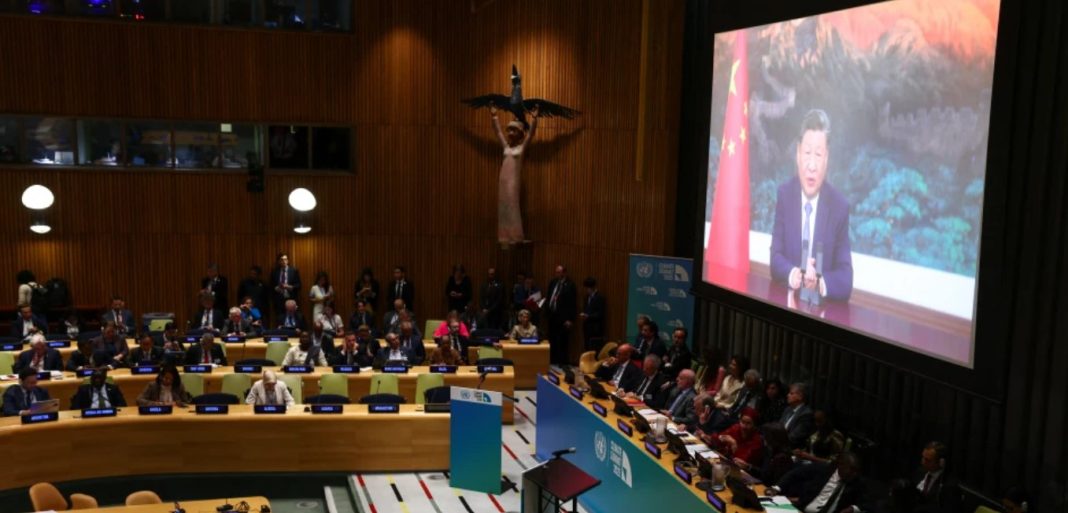China on Wednesday announced a new climate plan that includes cutting its greenhouse gas emissions by 7% to 10% from their peak by 2035, marking the first time the world’s largest emitter has pledged an absolute reduction rather than a cap on growth.
🌲Chinese President Xi Jinping delivered a video speech to the #UnitedNations #Climate Summit 2025 held in #NewYork on Wednesday. Xi announced that China aims to reduce its greenhouse gas (#GHG) emissions by 7% to 10% by #2035, compared to peak levels. pic.twitter.com/iqzIN1p1RD
— Chinese Embassy in US (@ChineseEmbinUS) September 24, 2025
Speaking via live video at a climate summit convened by U.N. Secretary-General António Guterres, President Xi Jinping also pledged to expand China’s wind and solar capacity sixfold from 2020 levels within a decade and raise the share of non-fossil fuels in energy consumption to over 30%. He framed the commitments as part of China’s long-term drive toward carbon neutrality by 2060.
“Green and low-carbon transformation is the trend of our times,” Xi said. Without naming the United States directly, he criticized countries “going against the trend,” urging the international community to “maintain unwavering confidence, unwavering action, and undiminished efforts.”
U.S. Moves in the Opposite Direction
The veiled reference came a day after U.S. President Donald Trump used his U.N. General Assembly address to dismiss climate change as a “con job” and to deride scientists as “stupid.” Trump also confirmed Washington’s withdrawal from the Paris Agreement for the second time, signaling his administration’s commitment to fossil fuels.
Political scientist Ian Bremmer said Trump’s remarks underscored a sharp contrast in strategy. “Trump wants fossil fuels and the United States is indeed a powerful petro-state,” Bremmer said. “But letting China become the world’s sole powerful electro-state is the opposite of making America great again … at least if you care about the future.”
Mixed Global Response
Reactions to China’s new targets were cautious. Climate experts had anticipated a reduction closer to 30% by 2035, aligning with China’s pledge to reach net-zero emissions by 2060. Li Shuo of the Asia Society called the announcement “underwhelming” given China’s rapid advances in renewable energy and electric vehicles, but noted it may still position Beijing as a more proactive global player as Washington retreats.
Other countries also outlined their climate pledges at the summit. Brazil committed to a 59% to 67% emissions reduction by 2035, alongside stricter efforts to halt deforestation. President Luiz Inácio Lula da Silva warned that weak targets could erode public trust. “Society is going to stop believing its leaders,” Lula said. “And all of us will lose because denialism may actually win.”
Australia promised to cut emissions 62% to 70% from 2005 levels by 2035, while the European Union said it was preparing a range of 66% to 72% below 1990 levels, though members have yet to finalize a common stance. The island nation of Palau, speaking for the Alliance of Small Island States, committed to slashing emissions to 44% of 2015 levels by 2035, highlighting the disproportionate risks faced by vulnerable nations.
U.N. Calls for Urgency
Secretary-General Guterres acknowledged progress since the 2015 Paris Agreement but warned it was insufficient to meet the treaty’s target of limiting warming to 1.5°C. Current policies would still see a temperature rise of 2.6°C, he said.
Read More: Alibaba surges amid Nvidia partnership, and rising U.S.–China tech tensions
“Now, we need new plans for 2035 that go much further, much faster,” Guterres urged.
Pressure Ahead of COP30
With COP30 scheduled in Brazil later this year, environmental groups say Wednesday’s pledges reflect incremental steps rather than the transformative action demanded by worsening climate impacts. China’s historic move to announce an absolute reduction target is being described as symbolically important, but its modest scope left many questioning whether the world’s largest emitter intends to lead or simply manage expectations.
As global divisions sharpen—between Washington’s climate skepticism and Beijing’s cautious leadership—the summit underscored both the fragility of multilateral climate cooperation and the urgency of deeper commitments.
GVS News Desk with input from wire agencies.














